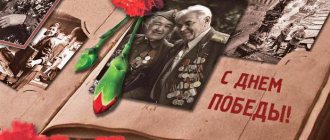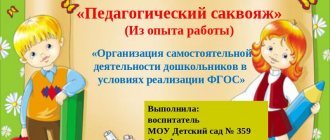MAGAZINE Preschooler.RF
Patriotic education in preschool educational institutions: problems and prospects.Patriotic education in a preschool educational institution is the interaction of a teacher, parents and children, aimed at revealing and developing universal moral qualities of an individual, familiarizing them with the origins of the national culture of the region, with their native nature, and a sense of belonging.
The formation of civically active, socially significant qualities in the younger generation is the most important moral value being revived in the Russian State.
Moral and patriotic education is one of the main and complex tasks of a preschool institution. The difficulty of solving this problem is related, first of all, to the age of the children. Indeed, in preschool age, not a single moral quality can be completely formed, but only laid down.
A sense of patriotism is formed in children gradually, in the process of accumulating knowledge and ideas about the social life of the country, people’s work, and nature. This complex feeling is born out of love for loved ones, for the place where the child was born, where he spent his childhood years, for his small homeland.
The problem of instilling love for the Motherland in children has always been relevant, but it has acquired particular significance at the present time.
Homeland? Fatherland? How does the child feel and how does he understand these words? Of course, there are images close to everyone: mother and father, parents, those who give life to a new creature. Raising a sense of patriotism in preschoolers is a complex and lengthy process. Love for loved ones, for kindergarten, for one’s hometown and home country play a huge role in the development of a child’s personality. And although many impressions are not yet deeply understood by him, when passed through childhood perception they play a huge role in the formation of the personality of a patriot.
Undoubtedly, every parent wants his child to grow up to be a worthy person and a worthy citizen of his country. And we are faced with the task of forming in children such character traits as love and respect for their native land, their home, kindergarten, home street, city. To form a sense of pride in the country’s achievements, love and respect for the army, pride in the courage of soldiers, and develop interest in the phenomena of social life accessible to the child.
The urgency of the problem lies in the fact that modern children know little about their hometown, country, the peculiarities of folk traditions, are often indifferent to close people, including group mates, and rarely sympathize with the grief of others. Working with parents on the issue of moral and patriotic education in the family is clearly insufficient.
The problem of educating the younger generation in the spirit of tolerance is more relevant now than ever, as it is due to changes in recent years in the life of the country. But it is not enough to say beautiful words; tolerance must be cultivated through the development of good habits, manners, a culture of interpersonal communication, and the art of living in a world of unlike people.
These problems are solved in all types of children's activities: educational, in games, in work, in everyday life, in the joint activities of the teacher and children.
Step-by-step work in this area of patriotic education is being implemented in the following areas:
- Methodological support.
- Work with children
- Working with parents
Each of the areas is interconnected and includes:
- Getting to know your hometown and its history. The yard, the street on which the child lives can also help to consolidate a sense of attachment and a sense of ownership (my yard, my street)! But this does not happen on its own. If parents walk with their children in the yard, on their street, show the children that they like both the yard and the street, if the child has his own favorite places in the yard and on the street, then you can count on the baby to be attached to them.
- Getting to know your native land and Russia
- Acquaintance with the most significant historical events of your country and people.
- Acquaintance with epic heroes and their exploits.
- Acquaintance with the state symbols of the city and country.
Methodological support:
Creation of a subject-development environment with a patriotic orientation.
Thematic and long-term planning contributes to the effective and systematic acquisition by children of knowledge about their country, native land, and the area where they live.
The teacher’s worldview, his personal example, views, judgments, active life position are the most effective factors in education. No amount of knowledge of a teacher will have any effect if he himself does not love his country, his city, his people. In education, everything should be based on the personality of the teacher. The main goal of carrying out methodological work with personnel on the patriotic education of preschool children is to improve the work of a preschool institution on this issue.
Thus, the development of a system of patriotic education is still relevant today. This is due to the fact that this process has been delayed due to difficulties not only of a financial nature, but also of a legal, organizational, methodological and methodological nature. All this indicates the need to continue work aimed at solving the entire range of problems of patriotic education, and the relevance of research on this issue.
The means of patriotic education is art: music, works of art, visual arts. Children look at paintings by I. Levitan, I. Shishkin, K. Yuon and other great artists who lovingly depicted the nature of their native Fatherland, listen to poems by A. Blok, S. Yesenin, music by P. Tchaikovsky, S. Prokofiev. It is necessary that works of art be highly artistic.
One of the directions in patriotic education is familiarization with the traditions of the people, with folk art.
In moral and patriotic education, the example of adults and close people is of particular importance. Using specific examples and facts from the lives of family members, it is necessary to work to familiarize oneself with the native land, starting with what is commonly called the “small Motherland” and gradually moving to such categories as the Fatherland, “duty to the Motherland,” etc.
The solution to the problem of patriotic education of preschool children lies in the joint work of the preschool educational institution and the family, aimed at instilling love for the Motherland in the child, based on a good knowledge of the traditions, history of their country and family.
| Next > |


